Marshal of the Soviet Union Andrei Antonovich Grechko
Andrei Antonovich was born in 1903 year in the Rostov region in a small village called Golodaevka. Now on this land stands the village of Kuibyshevo. The future commander wrote in his memoirs: “From here and there the Motherland began for me. From our small house, with comrades and classmates, with the teacher - strict, but infinitely kind, caring for us to grow up as hardworking and honest people who love their country. ” His father, Anton Vasilyevich, was a simple peasant, from time to time working as a physical education teacher at a local school. Andrew was the thirteenth (!) Child in the family. In total, Anton Vasilyevich and Olga Karpovna had fourteen children. Today it is impossible to imagine how people managed to raise such a horde of children.
In early childhood, Grechko was distinguished by ingenuity and restlessness. The villagers noted that Andryusha often did not obey the requirements of his parents, he grew up as an active boy with a well-developed imagination. He adored playing war games with his brothers. And once he barely survived, having decided without demand to play with weapons. It is also known that little Andrey loved listening to his father’s stories about military service. Perhaps that is why he chose for himself the profession of the military.
In the autumn of 1919, the Denikin divisions, rushing towards Moscow, were halted by the forces of the First Cavalry Army. After that, through the Donbass, the Bolsheviks launched an offensive against Rostov. The squadrons of the eleventh cavalry division entered Golodayevka in mid-December. Locals as one went out to meet the Red Army. Among them was Andrei Grechko. The tall, tall young man looked at with envy at the brave Budenovites, glittering with red asterisks on their caps. Their daring and proud posture caused admiration in the boyish soul. Grechko saw that among the horsemen there were quite a few young men who, like him, decided to go into battle for a new power.
The advancing units of the First Cavalry Army urgently needed timely delivery of ammunition. For this purpose, all horse transport of the residents of Golodayevka was mobilized for an indefinite period. Andrew on his horse carrying ammunition to the city of Rostov. It was there that he was lucky to meet the squadron commander and countryman Stepan Vasilenko. The brave trooper helped Grechko realize his cherished dream - he took a sixteen-year-old youth to his squadron and even gave out weapons and all the necessary equipment.
In January, 1920, after the liberation of Rostov, the young Red Armyman arrived in his native village to visit his family. Here he announced to his relatives that he intended to link his life with the Red Army. To the surprise of all, his father, Anton V. Grechko, approved his choice, saying parting words: “For twelve years I served the country. I happened to fight the Turks, liberate Bulgaria. I was promoted to Feldwebel, was wounded. Once at the review, the general for good service honored me - he shook his hand. So son, rise to this and you ... ". My father did not even think that in tens of years for many people it would be a great honor to shake hands with his son.
So in the cavalry squadron of the famous First Cavalry Army, the combat career of a Soviet commander began. Andrei Antonovich went through the entire Civil War, fighting a simple Red Army man. In Krasnodar, he graduated from the courses of red commanders, and in the 1926 year, the budding fighter was sent to a cavalry school. After its successful completion, Grechko was entrusted with a platoon, and after some time, a whole squadron as part of the first Separate cavalry brigade of the Moscow District. In the 1936 year, the future commander studied at the Military Academy. Frunze, after which he began to command the regiment. 26 July 1938 of the year was issued an order of the NPO of the USSR on the reorganization of the Belarusian Military District (in particular, the district was renamed Belarusian Special or BOVO). From October 1938, Grechko was appointed Chief of Staff of the BOVO Special Cavalry Division. And in the 1939 year, he took part in a campaign in Western Belarus and Western Ukraine in order to protect the lives and property of the inhabitants of these places from the Nazi troops, and also to deprive Germany of the opportunity to use these territories as a springboard for an attack on the USSR.
Andrei Antonovich was not able to meet the first days of the Great Patriotic War at the front. Before the war, he finished studying at the Academy of the General Staff. The commander passed the last operational art exam on 19 on June 1941. In those days he already understood that a grave danger hung over the USSR. And so it happened, the war broke out after three days. Grechko's first desire was to immediately go to the front to take part in the destruction of the Hitlerite hordes there, in the thick of the struggle. However, out of more than a hundred officers who left the academic bench with him, only a few were immediately seconded to the front. And Andrei Grechko was assigned to the operational management of the General Staff. He took this direction with mixed feelings. On the one hand, he understood how responsible and necessary the work was in this place during the tests that hit the country. However, on the other hand, he felt an ardent desire to fight the enemy on the battlefield. This feeling gave him no peace, forcing him to look for opportunities to transfer to the active parts. As a result, Grechko spent only the first twelve days of the war in the General Staff.
Despite the short period of work in the General Staff, Grechko remembered well the atmosphere of calm and confidence prevailing there. It would seem that the hardest first days of the Great Patriotic War should have caused doubts, hesitations, despondency. However, nothing like it was in sight. The task of Andrei Antonovich was to manage a consolidated operational map of the situation. At work, he often had to communicate with the chief of staff Georgy Zhukov, who, going to the report to Stalin, took the summary map from him. Here he met with Alexander Vasilevsky. A calm and attentive military leader always believed in the strength of our army. “Failures will end, we will overcome them, achieve a breakthrough,” he often said.
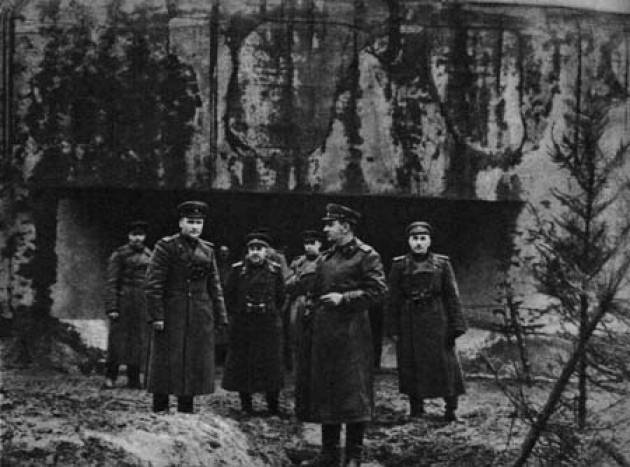
The General Staff worked hard all day and night, people slept right in the workplace. The situation at the front was changing so rapidly that often our headquarters did not have time to monitor the course of the struggle and lost control. Because of this, the information that came to the General Staff was contradictory or fragmentary. Despite the efforts to compile a complete picture of the fighting from the flow of reports, the map very often had unclear places and white spots. Grechko was angry, but only much later, already at the front, he realized how difficult it was for staff officers on the days of the Red Army to retreat to receive accurate data from the troops and transfer them to higher authorities.
On the tenth day of the war, Grechko had to accompany Tymoshenko, the former People's Commissar of Defense in those days, to the front. Having visited Smolensk, on the way back, Andrei Antonovich decided to turn to Semyon Konstantinovich with a request to send him to the front. First, the People's Commissar declined to answer: "To work in the General Staff is a more responsible task than to fight on the front line." However, on July 3, Georgy Zhukov entered the operations department and said to Grechko: “Congratulations, now you are the commander of the cavalry division. I wish you success, you can leave. ” Saying goodbye to his comrades and having heard their parting advice, Andrei Antonovich went to the South-Western Front in Kharkov. In the town of Pryluky he was to form the thirty-fourth cavalry division.
The hardest in his memories were the first days after arriving at the front. At this time (July 1941 of the year) there were defensive battles in Ukraine. A part of Grechko entered the battle south of Kiev in the first half of August as part of the fifth cavalry corps. As the illustrious commander himself would later write: “I tried to organize a fight according to all the rules, in strict accordance with the“ ideal ”teams taught to us at academies in peacetime. However, it turned out that we do not have practical skills for organizing interaction, conducting reconnaissance, stable communications, and much more necessary for war. And the point here is not that we were badly taught, but that it was much harder to use theory against an experienced enemy in combat practice than we thought. ”
Already at the front, Grechko realized that all theoretical knowledge could not compensate for the lack of real combat experience. Along with this, he personally saw how difficult it is to fight when the troops lack ammunition, machine guns, anti-tank weapons, and artillery. He wrote to the headquarters that he had nothing to repel the attacks of not only German tanksbut even the infantry that its part suffers heavy losses. And from above one after another amazing orders came: to crush the opposing enemy, to advance in such and such a direction. However, the confidence in victory did not leave Grechko himself, nor his soldiers and commanders for a second. The cavalry division, gritting its teeth, fought to the last. Even backing away, everyone believed that the Soviet people would stand.
In the fall of 1941, the myth of the invincibility of the German army was debunked in a battle near Moscow. Soviet soldiers, like all our people, were inspired by the first victories of the Red Army. Confidence fighters strengthened every day. At the end of 1941, Grechko led the Fifth Cavalry Corps, which, under his leadership in January 1942, together with the rifle formations of the fifty-seventh army, developing success on the main direction of the Southern Front, freed Barvenkovo (Barvenkovo-Lozovskaya offensive operation).
Since March, Grechko headed the task force that operated as part of the Southern Front in the Donbass, and in April the twelfth army was transferred to the skilled commander of the 1942. She took part in defensive battles on Voroshilovgrad direction. By the summer the fascists, concentrating huge forces in the south, rushed to the Caucasus and the Volga. Soviet troops retreated with heavy fighting. The twelfth army was also withdrawing. Soldiers marched to the Don, passing just east of Rostov. Somewhere very close was the native village of the commander - Golodayevka. Andrei Antonovich wrote about these days: “No matter how our fighters selflessly and valiantly fought, we continued to retreat. On the soul is not easy. Around the steppe, littered with slopes, beams, and in the distance coppices and orchards. Everything is familiar to the pain, even the air, filled with the smells of wormwood and thyme, is here especially native, evoking memories of childhood. ”
Soviet soldiers retreated. But both on the Donetsk land and in the North Caucasus, where the twelfth army was deployed, the Russian soldiers exhausted the enemy, forcing him to pay a high price for temporary success. In September, 1942, Andrei Antonovich, was appointed commander of the forty-seventh army, which did not allow the Nazis along the Black Sea coast and did not let them manage the Novorossiysk port. And from October 19 Grechko led the eighteenth army, which was fighting in the Tuapse direction. In November, he conducted a successful operation to eliminate the Semash enemy group that was trying to cross the Caucasus Mountains. By the end of the year, our troops thwarted the next plans of the fascist command - to penetrate into the Transcaucasus, and then on to India and the Middle East. The Nazis suffered heavy losses and were stopped by the unshakable steadfastness of the Russian soldiers.
Finally, the time has come to pay. Soviet troops destroyed the invaders at Stalingrad. The time has come to clear the North Caucasus of the fascists. In January, 1943, all the armies of the Transcaucasian Front launched an offensive. The Nazis fiercely resisted, but could not stop the attacking rush of our soldiers. From 5 in January 1943 of the year, Grechko was appointed commander of the fifty-sixth army, which broke through enemy defenses during the fierce battles and advanced to Krasnodar. Also, this army as part of the forces of the North Caucasus Front participated in the Krasnodar operation, which lasted from February to April. And the Soviet offensive continued on all fronts. The fascists suffered a major defeat in the summer near Kursk and fell back to the Dnieper. In September, the fifty-sixth army, interacting with the forces of the ninth and eighteenth armies, liberated the Taman peninsula (Novorossiysk-Taman offensive operation). October 1943 Andrei Antonovich was lucky to be the first to report to the front headquarters on the liberation of the Caucasus.
Shortly after the defeat of the German units in the Kuban (October 16 of 1943), Grechko, who displayed exceptional abilities, was given the post of deputy commander of the first Ukrainian front. He carried out a rearrangement of our troops from the Bukrinsky to the Lutezhsky bridgeheads, unnoticeable to the enemy. This was followed by a powerful strike of the third tank and thirty-eighth armies and on November 6 Kiev was liberated. A few days later, the territory of our country was cleared of the fascists, and the Red Army was waited by Europe that was put to its knees.
In December, 1943, Colonel-General Andrei Grechko became commander of the First Guards Army, which he led until the end of the war. At the end of the year, his troops advanced 180 kilometers during the Zhytomyr-Berdichev operation, releasing Zhytomyr simultaneously. In 1944, the first Guards participated in the Proskurov-Chernivtsi operation, which ended with the encirclement and defeat of the enemy's tank army near the city of Kamenets-Podolsk. The army acted competently during the Lvov-Sandomir offensive operation. In September 1944, the soldiers from the First Guards, together with the soldiers of the thirty-eighth and eighteenth armies, overcame the German defenses in the Eastern Carpathians and found themselves on the territory of Czechoslovakia (Eastern Carpathian offensive operation). And in January, the 1945-th army passed the highest point of the Carpathians, the High Tatras, and through the regions of Poland made its way to the Moravian-Ostrav region of Czechoslovakia. By participating in the Moravian-Ostrava operation, the army broke down the powerful defensive lines of the desperately defended fascists and by April 30 liberated the city of the same name. Then Grechko’s first Guards Army reached Prague with combat, having taken part in the Prague operation in May 1945, which put an end to the defeat of the German fascist troops.
After the Great Victory, Grechko headed the troops of the Kiev Military District for eight years. In 1953, he was appointed Commander-in-Chief of all Soviet units located in Germany. It was he who had to lead the suppression of the popular uprising in June of 1953. Consistently going through all the steps of the service ladder, in 1955, Andrei Grechko achieved the highest military rank - Marshal of the Soviet Union, and since November 1957, he became commander-in-chief of the Ground Forces, first deputy defense minister of the USSR. For courage and heroism in the fight against the German invaders, Andrei Antonovich 1, February 1958, was awarded the title Hero of the Soviet Union. From 1960, he headed the United Armed Forces of the Warsaw Pact countries, and on October 16, 1973, for services to the Fatherland for strengthening the Armed Forces, he was awarded the second Gold Star medal.
I never forgot Andrei Antonovich and his native places. Having been at the beginning of 1946 year at home, he saw the village almost completely destroyed. Soon a whole convoy of cars and carts with horses arrived to help their fellow countrymen. After that, the famous warlord came to his small homeland in 1958, 1961 and 1975. He helped with the equipment, took patronage over the new area in which the military builders erected residential and administrative buildings, a school.
By the beginning of 1967, Rodion Malinovsky remained the Minister of Defense of the USSR, supporting Brezhnev in 1964. In the West, he was considered the chief strategist of nuclear weapons. However, in reality, the phlegmatic and conservative Malinovsky was little interested in the struggle to develop missiles or go into space. The Minister of Defense did not trust any new equipment, for example, did not take helicopters seriously. According to colleagues, Rodion Yakovlevich did not like permutations and shaking. All ambitious and young military men grouped around his deputy, Andrei Antonovich. It can be assumed that Malinovsky did not have long before his retirement, but after the November 7 parade of November 1966, he came down to the hospital, which he no longer left.
In April 1967, Brezhnev appointed Andrei Antonovich, with whom he served in the Eighteenth Army, as a new minister. Grechko was at this important post for nine years and was remembered as a demanding and principled man, who did not tolerate people who did not take their places, that is, who were casual figures for the army. An indicative case is the incident with the twice Hero of the Soviet Union, Army General Joseph Gusakovsky in 1970. According to the instructions received from the higher instances demanding to take a course on the rejuvenation of senior commanders, he compiled a list of generals who, according to their age, had to resign. Iosif Iraklievich brought this list for approval by Grechko and asked him: “From whom shall we begin?”. Andrei Antonovich paused and replied: "Start, perhaps, from yourself." This is how Gusakovsky lost the post of the head of the GUK.
The troops Andrei Antonovich respected and loved. He was committed to the development of new types of military equipment. By his efforts, military helicopters and new models of tanks were adopted. He was tall and fit, almost two meters tall, and he always demanded that the soldiers in the units would go in for sports intensively. Of course, a person of this level cannot please everyone by definition. Andrei Antonovich often made unpopular decisions. However, in general, he remained in the memory of the military as an active and zealous owner of his department. His work as secretary of defense reflected well his time. Military camps were built, and the officers received decent housing. The monetary support of the servicemen was constantly growing, and they had no idea about which shishi to feed the family or how to arrange children in kindergarten. Training centers were built everywhere, maneuvers or exercises of various sizes were constantly under way, and the girls considered it fortunate to marry a Soviet officer.
Grechko never had problems with the KGB. He remembered well what was happening in the army in the late thirties. Having survived these terrible times, the commander made for himself one conclusion: it is impossible for an army to go into politics. Its task is to protect the homeland, and let others do politics. However, in the same year when Grechko assumed the post of Minister of Defense, Yuri Andropov became chairman of the KGB. Andrei Antonovich often showed his negative attitude to the increasing influence and growth of the bureaucratic structures of the State Security Committee, which caused a backlash from Andropov. However, Grechko’s influence on the Secretary General was enormous. It is known that the Marshal at meetings of the Politburo repeatedly torpedoed Brezhnev’s decisions, and Leonid Ilyich patiently demolished it. The only political capital of Andropov was only the trust of Brezhnev. The positions of Yuri Vladimirovich in the Politburo were weak, none of its members was a supporter of Andropov. However, by that time, the system of total surveillance was already established in the country. All figures of state and party leadership, including their relatives, were under the scrutiny of KGB agents. Summer cottage staff, cooks and bartenders, security officers, car drivers, shoemakers and tailors, to put it simply, all people serving party leaders collaborated with the Committee, providing comprehensive information about each of those in power, up to the secret details of their personal lives. Andropov’s goal from the very beginning was obviously one — the seizure of power in the country. And the only way out for him was to wait, and the timely elimination of competitors, for the benefit of the head of the secret service there was plenty for that.
A number of researchers propose the following interpretation of the plan of Yuri Vladimirovich: on the one hand, he wanted to eliminate or discredit all possible candidates for leadership of the country, on the other, to keep Brezhnev at his post until he had a chance to take his place. It is very difficult to believe that Andropov’s department was involved in the deaths of a number of prominent members of the Politburo, but historians say that statesmen died at that time very much in time. This happened, as a rule, in this way: in good health, the person went to sleep, and in the morning, the astonished guard found him dead in bed.
That is how the earthly journey of the famous marshal ended. 26 April 1976 of the year, Andrei Grechko returned after work to his dacha and went to bed. In the morning he did not wake up. Death came in a dream, suddenly, suddenly, for no apparent reason. The doctors failed to establish its reason; they assured everyone that, despite his years, the marshal was in excellent physical shape. The urn with the ashes of the commander was walled up in the Kremlin wall on Red Square. Six years later, something similar will happen to Leonid Ilyich himself. 9 November 1982 year Brezhnev, having talked in his office with Andropov, in a good mood will go to the cottage. And on the night of 9 on 10, November will pass away in a dream.
After the death of Andrei Antonovich, a technician (weapons systems specialist) Dmitry Ustinov was appointed to the post of Minister of Defense of the USSR in violation of the tradition. He was not a military officer, but he was a bosom friend of the KGB chairman. And, since someone had to command the army anyway, they appointed Sergei Leonidovich Sokolov, the most experienced combat officer, to the post of first deputy.
It is impossible in one article to give a comprehensive analysis of such a complex personality as Marshal of the Soviet Union Andrei Grechko. You can talk about his activities in 1960-1970's for a very long time. Perhaps, none of the Soviet defense ministers did so much to develop military equipment, increase the country's defense capability, and the combat readiness of all types of weapons of the Soviet Army. The Minister of Defense did not only direct the military-technical policy of the Soviet Union. He personally came to test new types of military equipment, thoroughly examined and analyzed with the general designers each model of the weapons they represented. Nobody cared so much about improving the material conditions of military personnel and the social status of officers. The commander paid much attention to military research, being the chairman of the editorial commissions of the multivolume editions of the Soviet Military Encyclopedia and The History of the Second World War 1939-1945s. He also chose the time to write several autobiographical books on military subjects. Grechko was awarded many orders and medals. Among them, six orders of Lenin and three Red Banners, Polish orders: the Grunwald Cross of the first degree (now canceled), as well as the oldest Virtuti Militari (Order of Military Valor) are worth noting. The soldier, military leader, statesman Andrei Antonovich Grechko will forever remain in our memory.
Information sources:
http://www.warheroes.ru/hero/hero.asp?Hero_id=1225
http://www.hrono.ru/biograf/bio_g/grechko_aa.php
http://www.peoples.ru/military/commander/grechko/
http://old.redstar.ru/2003/10/18_10/5_01.html
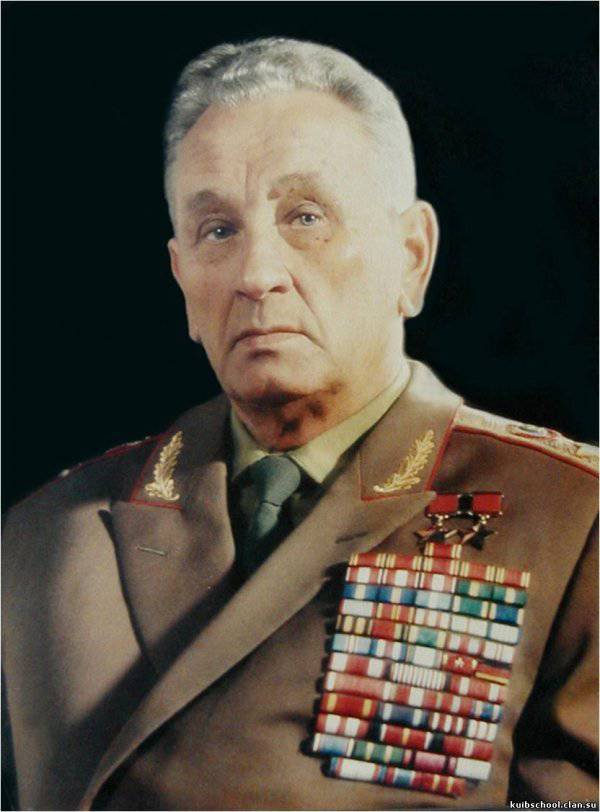
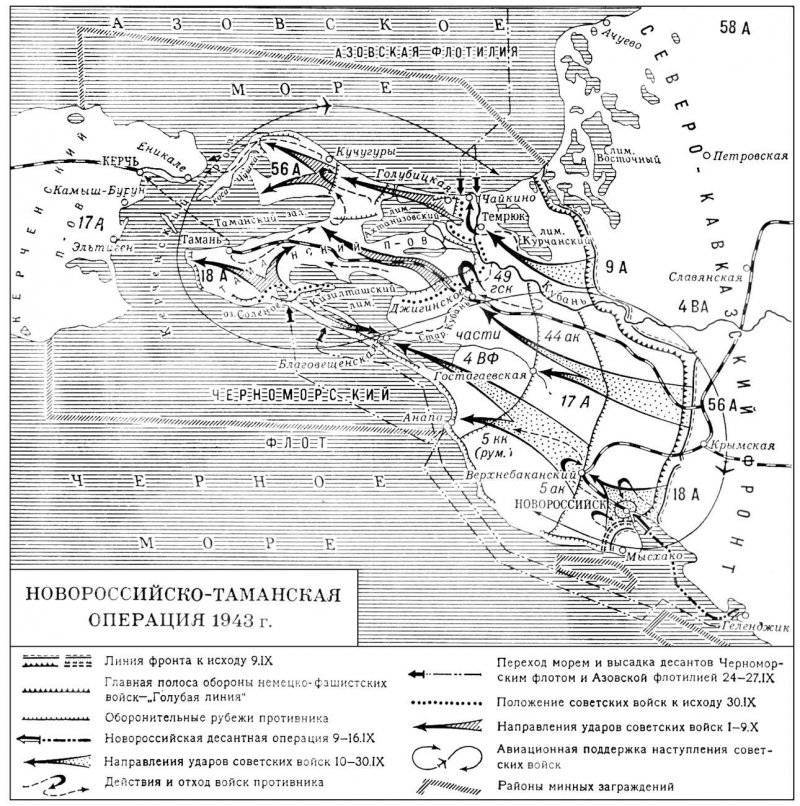
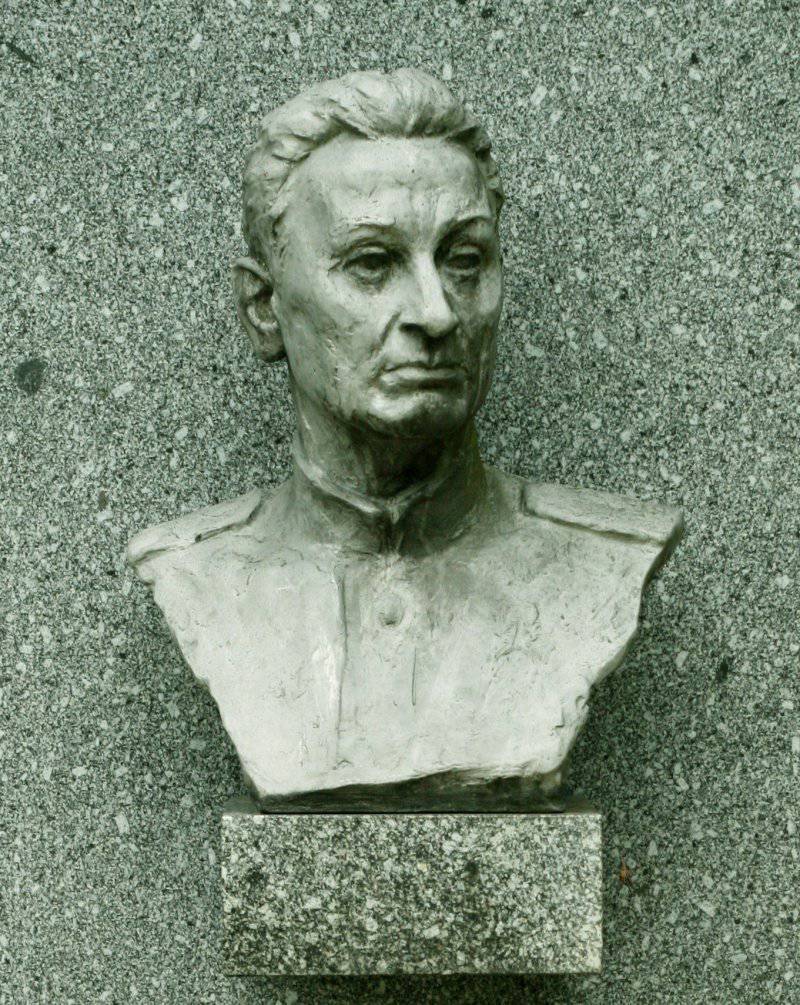
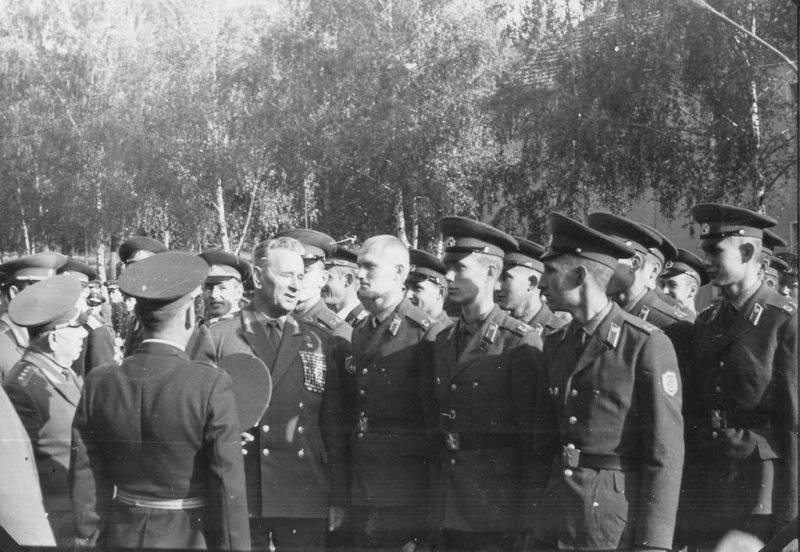
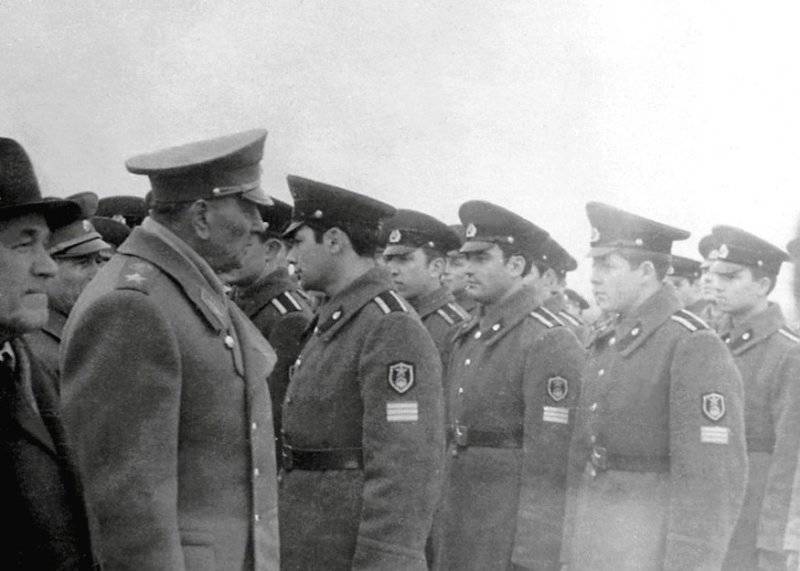
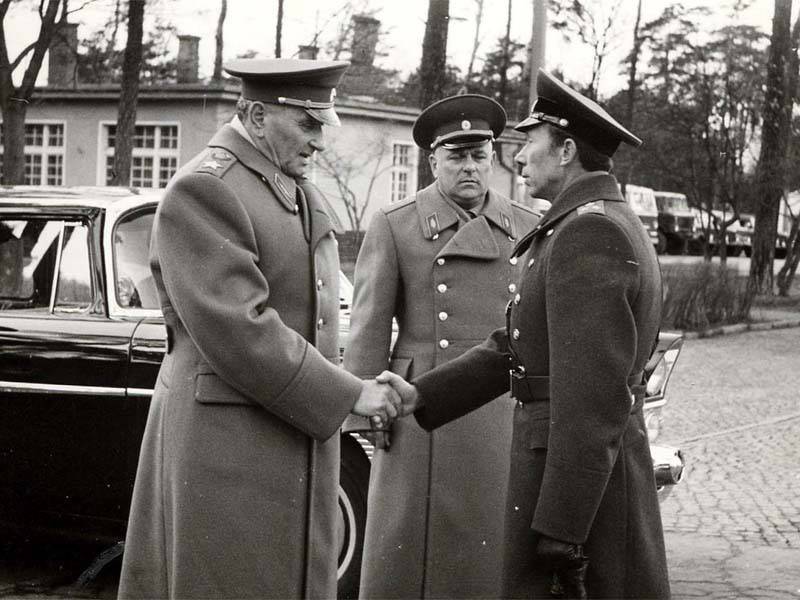
Information